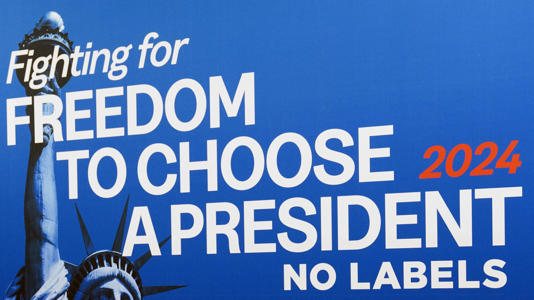The decision by the No Labels group to forego fielding a presidential candidate in the 2024 election marks a significant development in the realm of third-party politics and underscores the challenges faced by centrist movements in a polarized political landscape. In a statement issued by No Labels CEO Nancy Jacobson, the organization cited the inability to identify high-profile centrist candidates with a credible path to victory as the primary reason for its decision to stand down. This unexpected announcement not only solidifies the general election matchup between President Joe Biden and former President Donald Trump but also raises questions about the viability of third-party alternatives in a deeply divided political climate.
The absence of a No Labels candidate leaves anti-vaccine activist Robert F. Kennedy Jr. as the sole prominent outsider still seeking the presidency, highlighting the limited options available to voters dissatisfied with the major party candidates. Despite efforts to recruit centrist candidates and raise funds from undisclosed donors, No Labels ultimately concluded that the conditions were not conducive to mounting a viable presidential campaign. The decision was met with relief by Democrats, who feared that a No Labels candidate could potentially siphon votes away from Biden and aid Trump’s reelection bid.
The Wall Street Journal’s report on No Labels’ decision sheds light on the internal deliberations within the organization and the broader implications for the political landscape. While some view No Labels’ decision as a pragmatic step to avoid fracturing Biden’s coalition, others lament the missed opportunity to offer voters a centrist alternative amid growing disillusionment with the two-party system. MoveOn executive director Rahna Epting’s remarks underscore the urgency of uniting behind Biden to prevent a second Trump presidency while also signaling the challenges facing third-party candidates in gaining traction on the national stage.
The 2024 presidential election presents a unique set of challenges and opportunities for third-party movements seeking to disrupt the traditional political paradigm. As the Biden administration navigates a complex array of domestic and international challenges, the role of centrist organizations like No Labels in shaping the political discourse remains under scrutiny. While the decision not to field a presidential candidate may disappoint some advocates of bipartisanship, it also reflects the pragmatic realities of contemporary politics and the imperative of strategic decision-making in pursuit of broader objectives.
Looking ahead, the legacy of No Labels’ decision will be shaped by its impact on the political landscape and the trajectory of centrist movements in the United States. As voters grapple with issues ranging from economic inequality to climate change and healthcare, the demand for pragmatic solutions and bipartisan cooperation remains undiminished. Whether No Labels can continue to play a constructive role in fostering political consensus and bridging partisan divides remains an open question, but its decision to forgo a third-party campaign in 2024 will undoubtedly reverberate throughout the political arena for years to come.
No Labels’ decision not to field a presidential candidate in the 2024 election reflects the complexities of third-party politics and the challenges of navigating a deeply polarized political landscape. As the Biden administration and its allies seek to consolidate support and address pressing national priorities, the role of centrist organizations in shaping the political agenda remains a subject of ongoing debate and scrutiny. Whether No Labels can adapt to the evolving political environment and continue to advocate for bipartisan solutions remains to be seen, but its decision highlights the enduring influence of the two-party system and the difficulties faced by third-party movements in gaining traction on the national stage.
